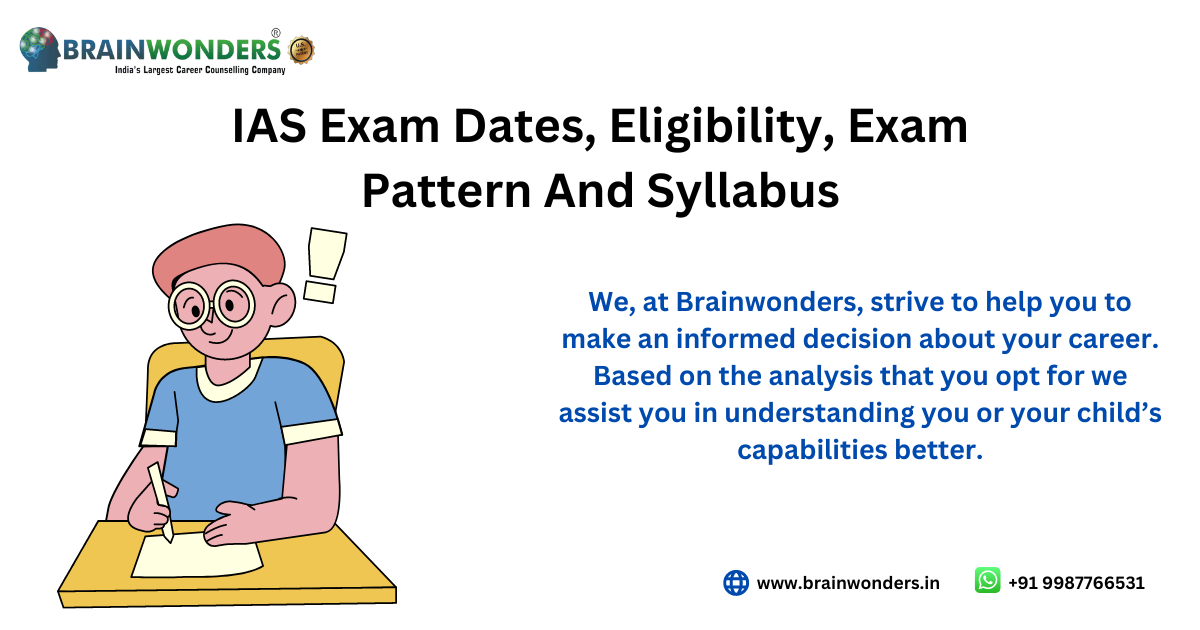

Are you aware which subjects and courses will bring you closer to your dream career?
Worry not, because the Brainwonders test and guidance will not only help you know it, but also follow it!
Blog
09 January,2023 | By Brainwonders

The Civil Services Examination, presently known as the Indian Administrative Service (IAS), was once known as the Imperial Civil Service (ICS). It is widely regarded as one of India's most difficult and competitive examinations.
The Union Public Service Commission is in charge of organising this examination for the purpose of filling officer positions in the All India Administrative Civil Service. Established in 1858 (under the name Imperial Civil Service) and renamed on January 26, 1950 (as Indian Administrative Service)
The Indian Administrative Service is the highest-ranking and most prestigious branch of the administrative civil service in the Indian government. When compared to the other 24 services, such as IPS and IFS, the Indian Administrative Service (IAS) holds the position of highest administrative rank. Although it is more commonly referred to as the IAS exam, the official name of this examination is the Civil Services Examination (CSE).
This examination is held annually by the Union Public Service Commission, which is the central recruiting agency (UPSC). The Indian Administrative Service (IAS) is a part of India's executive branch and serves as the country's permanent bureaucracy. It is one of the three services that make up the All India Services, and members of its cadre are eligible for employment with the Union Government, the State Governments, and public-sector businesses.
The Indian Administrative Service (IAS) is considered to be one of the most prestigious services out of the 24 that make up the Indian government, along with the likes of the IPS, IFS (Foreign), IFS (Forest), IP & TAFS, IAAS, IRS, IDAS, CMSE, IRTS, IRAS, ITS, CAPF-AF, and IAAS, to name a few.
The Union Public Service Commission (UPSC) is in charge of administering all of these tests under the guise of the Civil Services Examination (CSE) in order to choose the most qualified applicants for the available positions. Each year, lakhs of people put themselves up for this examination, putting their skills, experience, and good fortune to the test in the hopes of earning one of these prestigious positions. It is important to note that any officer selected into the IAS can be employed by the Union government, state governments, and/or public-sector undertakings.
Additionally, IAS officers get experience in a variety of job roles, such as the collector, head of public sector units, commissioner, chief secretary, and cabinet secretary, to name a few. During their time spent on deputation outside of India,
IAS officers may work for intergovernmental organisations such as the United Nations (UN), the World Bank (WB), the Asian Infrastructure Investment Bank (AIIB), the International Monetary Fund (IMF), the World Bank (WB), the Asian Development Bank (ADB), or any of the UN's agencies.
Before beginning the registration process, those who are interested in taking the UPSC IAS exam should make sure they are familiar with and have a good understanding of the requirements of the exam, including the syllabus, pattern, eligibility criteria, and application procedure, as well as any other pertinent details.
| IAS Exam Conducting Body | UPSC |
| Mode of IAS exam | Offline |
| Number of times conducted | Once every year |
| Prescribed age limit | 21 – 32 years (upper age relaxation for reserved candidates) |
| IAS Exam – Prelims 2022 | Sunday – 5th June, 2022 (Prelims 2021 was on 10th October 2021) |
| IAS Exam – Mains 2022 | 16th September 2022 onwards (exams for five days)(Mains 2021 took place between 7th and 16th January 2022) |
| IAS Exam Pattern | Prelims (MCQs), Mains (Descriptive papers) |
The IAS Exam pattern is:
| Sl. No. | Name of the Paper | Nature of the Paper | Duration of the Exam | Questions | Marks |
| 1 | IAS Exam Paper – I: General Studies | Merit Ranking Nature | 2 Hours | 100 | 200 Marks |
| 2 | IAS Exam Paper – II: General Studies (CSAT) | Qualifying Nature | 2 Hours | 80 | 200 Marks |
The second stage of the IAS Exam is referred to as the Mains Exam, and it is a written descriptive examination that consists of 9 separate papers. The following is a list of the nine papers that are included in the IAS Exam (Mains): Paper-A (Compulsory Indian Language) and Paper-B (English) are of a qualifying character, whilst the other papers, such as the Essay, General Studies Papers I, II, III, and IV, and Optional Papers I and II, are taken into consideration for the final ranking..
| Sl. No. | IAS Exam Paper | Name of the Paper | Nature of the Paper | Duration of the Exam | Marks |
| 1 | Paper – A | Compulsory Indian Language | QUALIFYING NATURE | 3 Hours | 300 Marks |
| 2 | Paper – B | English | 3 Hours | 300 Marks | |
| 3 | Paper – I | ESSAY | MERIT RANKING NATURE | 3 Hours | 250 Marks |
| 4 | Paper – II | General Studies I | 3 Hours | 250 Marks | |
| 5 | Paper – III | General Studies II | 3 Hours | 250 Marks | |
| 6 | Paper – IV | General Studies III | 3 Hours | 250 Marks | |
| 7 | Paper – V | General Studies IV | 3 Hours | 250 Marks | |
| 8 | Paper – VI | Optional Paper I | 3 Hours | 250 Marks | |
| 9 | Paper – VII | Optional Paper II | 3 Hours | 250 Marks | |
| TOTAL | 1750 Marks | ||||
| Interview or Personality Test | 275 Marks | ||||
| GRAND TOTAL | 2025 Marks | ||||
Candidates who pass the Mains stage of the IAS test with the required minimum score are qualified to move on to the last step of the IAS exam, which is the Personality Test or Interview round with members of the UPSC Board. The Commission will send an electronic summons to the candidates who have advanced to the final stage in order for them to participate in a face-to-face discussion round with the members of the board.
During this phase of the selection process, the panel will question the candidates about their hobbies, general knowledge, current events, and situational questions among other topics in order to determine whether or not they possess the personality characteristics necessary for a successful career in the civil service. Only the UPSC Bhavan in New Delhi will be the location of the personality test administered by the UPSC.
Candidates who want to take the IAS exam need to meet certain requirements, including those pertaining to their nationality, age, number of attempts, and educational background. Aspirants who wish to be considered for the general category must fulfil the following requirements: they must be a citizen of India or a PIO; they must also hold a graduate degree; they must be between the ages of 21 and 32; and they must not have taken the IAS exam more than six times. Having said that, the parameters outlined above are not without exceptions or other relaxations.
The application process for UPSC exams is done online, and admit cards for UPSC exams are also provided online and may be downloaded from the official UPSC website by those who are interested in taking the IAS exam.
Pursuing higher education in the relevant discipline is the initial step toward a career. You can get the training you need to do what you want to do at some of the best educational institutions in the world.
So, tell me, what exactly are you anticipating?
Get in touch with our team of knowledgeable Educational counsellors at Brainwonders to learn more about pursuing IAS Exam and schedule a no-cost consultation appointment right away. To know more about the Careers, you must read our site, The Careers Hub.
Worry not, because the Brainwonders test and guidance will not only help you know it, but also follow it!
_Course,_Admission,_Fees,_Salary,_Duration,_Syllabus,_Colleges.png)

